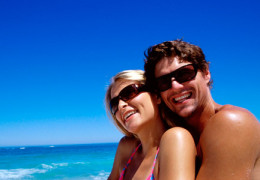Sunglasses have other uses than just as a fashion accessory to a particular outfit.
- Sunglasses will help to protect your eyes from harmful UV Rays
Ultraviolet (UV) radiation has been attributed to the development of many eye problems including cataracts and age-related macula degeneration (AMD). They will also help to prevent wrinkles by protecting the delicate skin around the eyes from premature ageing. Good quality sunglasses protect your eyes from 100% of sun’s harmful UV rays.
- Sunglasses reduce glare
Most surfaces will reflect light. Water, snow, car windshields and the road surface are some of the most common surfaces that we experience reflected light. Extremely bright reflections can distracting and interfere with vision. This is particularly dangerous when driving, riding a motorbike, skiing or boating.
Consider sunglasses such as those that include polarised filters or mirror coatings will reduce glare for safer and more comfortable vision.
- Sunglasses protect your eyes from wind, dust and debris
Whether you are out cycling, skiing or just enjoying the view outdoors, sunglasses are an effective wind barrier. They reduce the rate of evaporation of tears and helps keep your eyes moist and comfortable. If you wear contact lenses, sunglasses will help to keep them moist and prevent windblown particles from getting in your eyes and causing a corneal abrasion. Consider close-fitting “wrap” style frames as these are a particularly effective barrier.
- Sunglasses reduce headaches and eyestrain
In very bright conditions, the pupil which controls the amount of light reaching the light sensitive retina, cannot constrict small enough to reduce light to a comfortable level. This causes a person to squint, using the eyelids to further reduce light entering the eye. Muscle fatigue associated with squinting and constant constriction of the pupil can lead to headache and eyestrain.
Sunglasses reduce the amount of light reaching the eyes to a more comfortable level, eliminating the need for squinting and severe pupil constriction. Ensure you buy sunglasses that provide the correct amount of protection
- Sunglasses can enhance vision
All sunglass lenses are tinted to cut down on overall brightness and enhance terrain definition. By selecting the correct colour tint for your sport or activity will help to improve your visual acuity for that environment. Conversely, certain bright or unusual colours may alter your colour perception adversely. From a visual standpoint this is why it is usually best to choose lenses that are grey, brown or green.
When is it most important to wear sunglasses?
It’s generally a good idea to wear sunglasses anytime you’re outdoors but especially when:
- In summer when UV radiation is at least 3 times higher than it is during winter
- At the beach or near the water (one of the most reflective surfaces)
- You’re in the mountains or outside at any high elevations.



